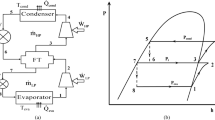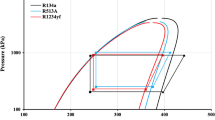Abstract
A two-stage vapor compression refrigeration system was investigated using advanced-exergy-based analysis, which examines the effects of each component and their interactions with each other for system development. The advanced-exergy-based analysis guides how much improvement can be made on the parts of the system, examining exergy destruction in the form of endogenous/exogenous and avoidable/unavoidable parts. In addition, a parametric study was conducted and the performances of different refrigerants were evaluated to analyze the system under various operating conditions. The highest exergy destruction arises as 8.1 kW for R227ea. The total compressor works decrease 0.667 kW by changing the refrigerant from R227ea to R142b. R152a shows a preferable performance along with environmentally friendly characteristics. The condenser has the most critical improvement potential with 0.869 kW, and it accounts for 31% of the total irreversibility. It is followed by the evaporator 0.734 kW (26.2%). All exergy destruction in the evaporator falls into endogenous-part. The irreversibility of the evaporator is directly related to inner inefficiency. Coefficient of performance decreases by 40% for a condenser temperature variation from 30 to 50 °C. An increment in the evaporator temperature from − 15 to 0 °C increases coefficient of performance by 49.95%. The avoidable exergy-destruction rate can be minimized by 24.89% for that temperature variation.










Similar content being viewed by others

Abbreviations
- c p :
-
Specific heat (kJ. kg−1 K−1)
- h :
-
Specific enthalpy (kJ. kg−1)
- ṁ :
-
Mass flow rate (kg. s−1)
- P :
-
Pressure (kPa)
- P c :
-
Critical pressure (kPa)
- Q :
-
Heat load (kW)
- s :
-
Specific entropy (kJ. kg−1 K−1)
- T :
-
Temperature (ºC)
- T c :
-
Critical temperature
- W:
-
Work (kW)
- ALT:
-
Atmospheric lifetime
- CON:
-
Condenser
- COMP:
-
Compressor
- COP:
-
Coefficient of performance
- Ex:
-
Exergy (kW)
- EXV:
-
Expansion valve
- EVA:
-
Evaporator
- FLC:
-
Flash chamber
- GWP:
-
Global warming potential
- HPC:
-
High-pressure compressor
- LPC:
-
Low-pressure compressor
- M:
-
Molecular mass
- MXC:
-
Mixing chamber
- NBP:
-
Normal boiling point
- ODP:
-
Ozone depletion potential
- LFL:
-
Lower flammability limit
- dest:
-
Destruction
- F :
-
Fuel
- k :
-
kth-component
- P :
-
Product
- amb:
-
Ambient
- AV:
-
Avoidable
- EN:
-
Endogenous
- EX:
-
Exogenous
- UN:
-
Unavoidable
- η ex :
-
Exergy efficiency
References
Al-Sayyab AKS, Abdulwahid MA (2019) Energy-exergy analysis of multistage refrigeration system and flash gas intercooler working with ozone-friendly alternative refrigerants to R134a. J Adv Res Fluid Mech Therm Sci 63(2):188–198
Ambriz-Díaz VM et al (2020) Advanced exergy and exergoeconomic analysis for a polygeneration plant operating in geothermal cascade. Energy Convers Manag 203:112227. https://doi.org/10.1016/j.enconman.2019.112227
Anvari S, Khoshbakhti Saray R, Bahlouli K (2015) Conventional and advanced exergetic and exergoeconomic analyses applied to a tri-generation cycle for heat, cold and power production. Energy 91:925–939. https://doi.org/10.1016/j.energy.2015.08.108
Baakeem SS, Orfi J, Alabdulkarem A (2018) Optimization of a multistage vapor-compression refrigeration system for various refrigerants. Appl Therm Eng 136:84–96. https://doi.org/10.1016/j.applthermaleng.2018.02.071
Bai T, Yu J, Yan G (2016) Advanced exergy analyses of an ejector expansion transcritical CO2 refrigeration system. Energy Convers Manag 126:850–861. https://doi.org/10.1016/j.enconman.2016.08.057
Bhatkar VW, Kriplani VM, Awari GK (2013) Alternative refrigerants in vapour compression refrigeration cycle for sustainable environment: a review of recent research. Int J Environ Sci Technol 10(4):871–880. https://doi.org/10.1007/s13762-013-0202-7
Chakravarthy VS, Shah RK, Venkatarathnam G (2011) A review of refrigeration methods in the temperature range 4–300 K. J Therm Sci Eng Appl 10(1115/1):4003701
Chen H, Goswami DY, Stefanakos EK (2010) A review of thermodynamic cycles and working fluids for the conversion of low-grade heat. Renew Sustain Energy Rev. https://doi.org/10.1016/j.rser.2010.07.006
Chopra K, Sahni V, Mishra RS (2015) Energy, exergy and sustainability analysis of two-stage vapour compression refrigeration system. J Therm Eng 1(4):440–445. https://doi.org/10.18186/jte.95418
Cimsit C, Ozturk IT (2012) Analysis of compression-absorption cascade refrigeration cycles. Appl Therm Eng 40:311–317. https://doi.org/10.1016/j.applthermaleng.2012.02.035
Ergün A, Gürel AE, Ceylan İ (2018) Ticari soğutma sistemlerinde R22 akışkanının alternatifi olarak R438a ve R417a akışkanlarının performansının incelenmesi. Gazi Üniversitesi Fen Bilimleri Dergisi Part C Tasarım Ve Teknoloji [preprint]. https://doi.org/10.29109/gujsc.406628
Gholamian E, Hanafizadeh P, Ahmadi P (2018) Advanced exergy analysis of a carbon dioxide ammonia cascade refrigeration system. Appl Therm Eng 137:689–699. https://doi.org/10.1016/j.applthermaleng.2018.03.055
Gullo P, Elmegaard B, Cortella G (2016) Advanced exergy analysis of a R744 booster refrigeration system with parallel compression. Energy 107:562–571. https://doi.org/10.1016/j.energy.2016.04.043
Gürel AE, Agbulut Ü et al (2020a) Energy, exergy and environmental assessments (3E) of various refrigerants in the refrigeration systems with internal heat exchanger. Heat Transf Res 51:1029
Gürel AE, Ağbulut Ü et al (2020b) Environmental and economic assessment of a low energy consumption household refrigerator. Eng Sci Tech Int J 23:365
Jain V, Sachdeva G, Kachhwaha SS (2018) Comparative performance study and advanced exergy analysis of novel vapor compression-absorption integrated refrigeration system. Energy Convers Manag 172(June):81–97. https://doi.org/10.1016/j.enconman.2018.06.116
Jain V et al (2020) Advanced exergy analysis and risk estimation of novel NH3–H2O and H2O–LiBr integrated vapor absorption refrigeration system. Energy Convers Manag. https://doi.org/10.1016/j.enconman.2020.113348
Jelinek M, Levy A, Borde I (2008) The performance of a triple pressure level absorption cycle (TPLAC) with working fluids based on the absorbent DMEU and the refrigerants R22, R32, R124, R125, R134a and R152a. Appl Therm Eng. https://doi.org/10.1016/j.applthermaleng.2008.01.023
Kelly S, Tsatsaronis G, Morosuk T (2009) Advanced exergetic analysis: approaches for splitting the exergy destruction into endogenous and exogenous parts. Energy 34(3):384–391. https://doi.org/10.1016/j.energy.2008.12.007
Kilicarslan A, Hosoz M (2010) Energy and irreversibility analysis of a cascade refrigeration system for various refrigerant couples. Energy Convers Manag 51(12):2947–2954. https://doi.org/10.1016/j.enconman.2010.06.037
Lemmon EW, Huber ML, McLinden MO (2010) NIST Standard Reference Database 23: Reference Fluid Thermodynamic and Transport Properties-REFPROP, Version 9.0. Nat Inst Stand Technol Stand Ref Data Program Gaithersburg
Li G (2019) Organic rankine cycle environmental impact investigation under various working fluids and heat domains concerning refrigerant leakage rates. Int J Environ Sci Technol 16(1):431–450. https://doi.org/10.1007/s13762-018-1686-y
Li Y et al (2012) A trigeneration system based on compressed air and thermal energy storage. Appl Energy. https://doi.org/10.1016/j.apenergy.2012.04.048
Liu Y, Yu J (2018) Performance analysis of an advanced ejector-expansion autocascade refrigeration cycle. Energy 165:859–867
Massuchetto LHP et al (2019) Thermodynamic performance evaluation of a cascade refrigeration system with mixed refrigerants: R744/R1270, R744/R717 and R744/RE170. Int J Refrig. https://doi.org/10.1016/j.ijrefrig.2019.07.005
Morosuk T, Tsatsaronis G (2009) Advanced exergetic evaluation of refrigeration machines using different working fluids. Energy 34(12):2248–2258. https://doi.org/10.1016/j.energy.2009.01.006
Mossi Idrissa AK, Goni Boulama K (2019) Advanced exergy analysis of a combined brayton/brayton power cycle. Energy 166:724–737. https://doi.org/10.1016/j.energy.2018.10.117
Mousavi SA, Mehrpooya M (2020) A comprehensive exergy-based evaluation on cascade absorption-compression refrigeration system for low temperature applications - exergy, exergoeconomic, and exergoenvironmental assessments. J Clean Prod 246:119005. https://doi.org/10.1016/j.jclepro.2019.119005
Özkaraca O, Keçebaş A, Demircan C (2018) Comparative thermodynamic evaluation of a geothermal power plant by using the advanced exergy and artificial bee colony methods. Energy 156:169–180. https://doi.org/10.1016/j.energy.2018.05.095
Saleh B (2016) Performance analysis and working fluid selection for ejector refrigeration cycle. Appl Therm Eng. https://doi.org/10.1016/j.applthermaleng.2016.06.147
Da Silva A, Bandarra Filho EP, Antunes AHP (2012) Comparison of a R744 cascade refrigeration system with R404A and R22 conventional systems for supermarkets. Appl Therm Eng. https://doi.org/10.1016/j.applthermaleng.2011.12.019
Sun DW (1999) Comparative study of the performance of an ejector refrigeration cycle operating with various refrigerants. Energy Convers Manag. https://doi.org/10.1016/S0196-8904(98)00151-4
Torrella E, Llopis R, Cabello R (2009) Experimental evaluation of the inter-stage conditions of a two-stage refrigeration cycle using a compound compressor. Int J Refrig 32(2):307–315. https://doi.org/10.1016/j.ijrefrig.2008.05.006
Tsatsaronis G, Kelly SO and Morosuk TV (2006) IMECE2006–13 pp 1–7
Tsatsaronis G, Park MH (2002) On avoidable and unavoidable exergy destructions and investment costs in thermal systems. Energy Convers Manage 43(9–12):1259–1270. https://doi.org/10.1016/S0196-8904(02)00012-2
Ustaoglu A et al (2020a) Performance optimization and parametric evaluation of the cascade vapor compression refrigeration cycle using Taguchi and ANOVA methods. Appl Therm Eng 180(May):115816. https://doi.org/10.1016/j.applthermaleng.2020.115816
Ustaoglu A, Ozbey U, Torlaklı H (2020b) Numerical investigation of concentrating photovoltaic/thermal (CPV/T) system using compound hyperbolic –trumpet V-trough and compound parabolic concentrators. Renew Energy 152:1192–1208. https://doi.org/10.1016/j.renene.2020.01.094
Ustaoglu A (2020) Parametric study of absorption refrigeration with vapor compression refrigeration cycle using wet, isentropic and azeotropic working fluids: conventional and advanced exergy approach. Energy 201:117491. https://doi.org/10.1016/j.energy.2020.117491
Ustaoglu A et al (2017) Enhanced exergy analysis of a waste heat powered ejector refrigeration system for different working fluids. Int J Exergy 24:2–4. https://doi.org/10.1504/IJEX.2017.087698
Varga S, Lebre PMS, Oliveira AC (2013) CFD study of a variable area ratio ejector using R600a and R152a refrigerants. Int J Refrig. https://doi.org/10.1016/j.ijrefrig.2012.10.016
Vasta S et al (2018) Adsorption-compression cascade cycles: an experimental study. Energy Convers Manag. https://doi.org/10.1016/j.enconman.2017.11.061
Wang Z et al (2016) Conventional and advanced exergy analyses of an underwater compressed air energy storage system. Appl Energy 180:810–822. https://doi.org/10.1016/j.apenergy.2016.08.014
Wang H et al (2016) Experimental study of the behavior of a hybrid ejector-based air-conditioning system with R134a. Energy Convers Manag. https://doi.org/10.1016/j.enconman.2016.01.010
Yıldız A, Yıldırım R (2021) Investigation of using R134a, R1234yf and R513A as refrigerant in a heat pump. Int J Environ Sci Technol 18(5):1201–1210. https://doi.org/10.1007/s13762-020-02857-z
Zhao H et al (2019) Conventional and advanced exergy analysis of parallel and series compression-ejection hybrid refrigeration system for a household refrigerator with R290. Energy 166:845–861. https://doi.org/10.1016/j.energy.2018.10.135
Acknowledgements
The author would like to thank all who assisted in conducting this work.
Author information
Authors and Affiliations
Corresponding author
Ethics declarations
Conflict of interest
The authors declare that they have no conflict of interest.
Ethical approval
This article does not contain any studies with human participants or animals performed by any of the authors.
Additional information
Editorial responsibility: Q. Aguilar-Virgen.
Rights and permissions
About this article
Cite this article
Kaya, A.M. Examination of the performance effects of refrigerants in a multistage refrigeration cycle using advanced exergy analysis. Int. J. Environ. Sci. Technol. 19, 6163–6182 (2022). https://doi.org/10.1007/s13762-022-04227-3
Received:
Revised:
Accepted:
Published:
Issue Date:
DOI: https://doi.org/10.1007/s13762-022-04227-3



